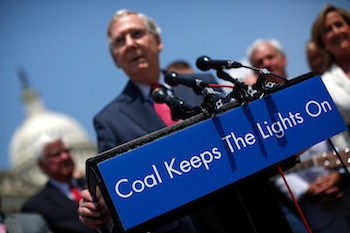A week after their electoral victories in the 2014 midterms, Senate Republicans have already set their sights on one of their all-time favorite targets: the Environmental Protection Agency.
Republican Senator Mitch McConnell of Kentucky, who will become the Senate majority leader when the 2015 Congress convenes, announced last week that one of his main goals was to “rein in” the EPA. One of the main items that McConnell has problems with is the agency’s power plant emissions standards that would cut down on the amount of allowable air pollution from coal-fired power plants.
McConnell said that he feels a “deep responsibility” to stop these power plant rules.
McConnell ran his campaign on an anti-environment, pro-coal platform, playing up Kentucky’s fears that the EPA’s policies would kill jobs in the coal-dependent state. McConnell’s challenger, Democratic candidate Alison Grimes, could have easily challenged those talking points, but failed to do so.
Nevertheless, the facts are there, and the coal industry has had a devastating effect on Kentucky, as I previously reported:
In a nutshell, the coal industry is a net negative for the state of Kentucky. When considering only the direct costs that the coal mining industry encounters, which includes research and development, training, and repairing the infrastructure that is destroyed or degraded during coal mining and moving, the industry is in the red.
But the true cost of coal for Kentucky is more than what the industry spends or puts back into the economy. The residents who aren’t involved in the industry in any way are paying a very large price.
Coal mining and coal dumping sites are riddled with both poverty and exceedingly higher than average rates of cancer. Both of these external costs are shifted onto the taxpayers and federal government, who will ultimately have to pay for assistance and healthcare for those affected by the industry’s activities.
And it gets even worse. Kentucky, as a direct result of the coal industry, is home to Congressional districts that rank last in the country in life expectancy, general well-being, and emotional and physical health.
The reason these statistics about Kentucky are so important is because this has become the new Republican Party blueprint for America. Their incessant attacks on the EPA’s power plant emissions rule could turn the rest of the country into the same pollution-filled quagmire that Kentucky has become.
The power plant rules are just the tip of the iceberg for what the new class of Republican legislators have in store. As The Hill points out, these Republicans believe that the midterm results were a clear “mandate” showing that the American people want the EPA’s reach significantly cut back. The Hill continues:
Republican lawmakers are planning an all-out assault on Obama’s environmental agenda, including rules on mercury and other air toxics from power plants, limits on ground-level ozone that causes smog, mountaintop mining restrictions and the EPA’s attempt to redefine its jurisdiction over streams and ponds.
The Interior Department is also in the crosshairs, with rules due to come soon on hydraulic fracturing on public land and protecting streams from mining waste.
Many of the rules are part of the “war on coal” that Republicans have accused Obama of waging. They charge that Obama has tried to revive cap-and-trade rules for carbon emissions despite the 2009 failure of legislation when Democrats controlled both chambers of Congress.
It is important to remember that environmental protection has not always been a partisan issue. The Environmental Protection Agency, after all, was created by a Republican president, Richard Nixon.
But as corporate money has been allowed to flow unabated into our political system — with the oil & gas industries kicking in $50 million for this year’s elections and electric utilities throwing in $16 million — environmental causes have become increasingly partisan, and increasingly unpopular with elected officials.
Subscribe to our newsletter
Stay up to date with DeSmog news and alerts







